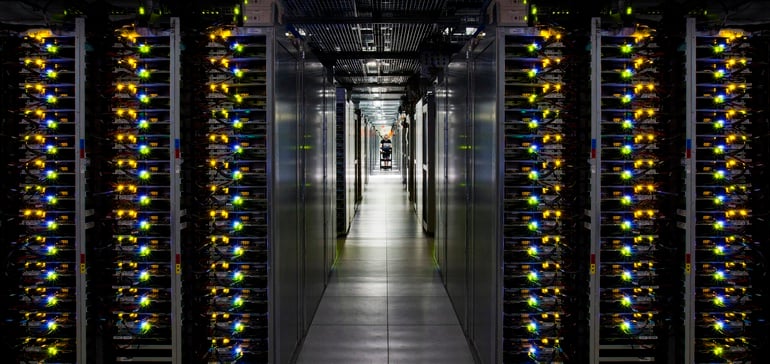
Dive Brief:
Dive Insight:
Google has been carbon-neutral since 2007, and matches all of its energy usage with 100% renewable energy purchases. The computing giant says it is now working toward developing carbon-free energy everywhere it has data centers and wants to power operations on a region-specific, 24/7 basis with clean, zero-carbon energy.
"To date, we've signed more than 50 long-term contract commitments to buy energy from wind and solar farms around the world, totaling more than 5 GW of new generation capacity since 2010," a Google spokesperson told Utility Dive in an email.
A big part of Google's carbon reduction efforts includes improving the efficiency of the infrastructure running the internet.
Data centers have made strides in reducing energy consumption through more efficient construction, as well as being built in areas where there is a natural cooling ability, as heat management is a major source of energy consumption. Google built one of its data centers in Finland on the water, using seawater from the Bay of Finland for cooling to reduce energy use.
But more recently, efficiency advances have come from advances in computing power and shifting processes to less carbon-intensive periods. Google is not sharing specific metrics on its artificial intelligence-driven advances, but the company says "early results for the new carbon-intelligent computing platform are promising."
"Results will further improve as we roll the system out to our global data center fleet and incorporate new features into the system," the company said. "Because we were able to achieve these results without interfering in existing workflows or incurring new energy or hardware costs, we believe such an approach can be applied more broadly across the industry."
In Uptime Institute's study of 300 data centers, infrastructure older than five years accounted for two-thirds of IT energy use, but contributed just 7% of the computing capacity.
"Energy-saving opportunities on the IT side are so great that if fully addressed, they would significantly reduce data center energy use and carbon footprint, would slash energy bills and would likely lead to reduced demand for cooling and critical power equipment," according to the business infrastructure advisory group.
Google says its own data centers are "designed, built, and operated to maximize the efficient use of resources," and now use 50% less energy than than a "typical" data center while delivering 7x the computing power per watt than they did five years ago.
The company says its carbon-intelligent computing platform is a first-of-its kind system that can "shift the timing of many compute tasks to when low-carbon power sources, like wind and solar, are most plentiful. This is done without additional computer hardware and without impacting the performance of Google services like Search, Maps and YouTube that people rely on around the clock."
In the future, Google says it may move flexible computing tasks between different data centers, "so that more work is completed when and where doing so is more environmentally friendly."
Google is not alone in its efforts to utilize clean energy for data centers. Facebook is also aiming to support all of its global operations with 100% renewable energy by the end of this year, and is "on track to meet that goal," a company spokesperson told Utility Dive.
The social media giant has contracted for approximately 5 GW of new renewable energy with more than 50 wind and solar projects in the US, Singapore and Europe. In 2018, Facebook reached 75% renewable energy for its operations; in 2019, that figure rose to 86%.
"machine" - Google News
May 04, 2020 at 09:13PM
https://ift.tt/2ypFZy9
Google machine learning shifts data center ops to maximize efficiency, renewables use - Utility Dive
"machine" - Google News
https://ift.tt/2VUJ7uS
https://ift.tt/2SvsFPt
Bagikan Berita Ini














0 Response to "Google machine learning shifts data center ops to maximize efficiency, renewables use - Utility Dive"
Post a Comment